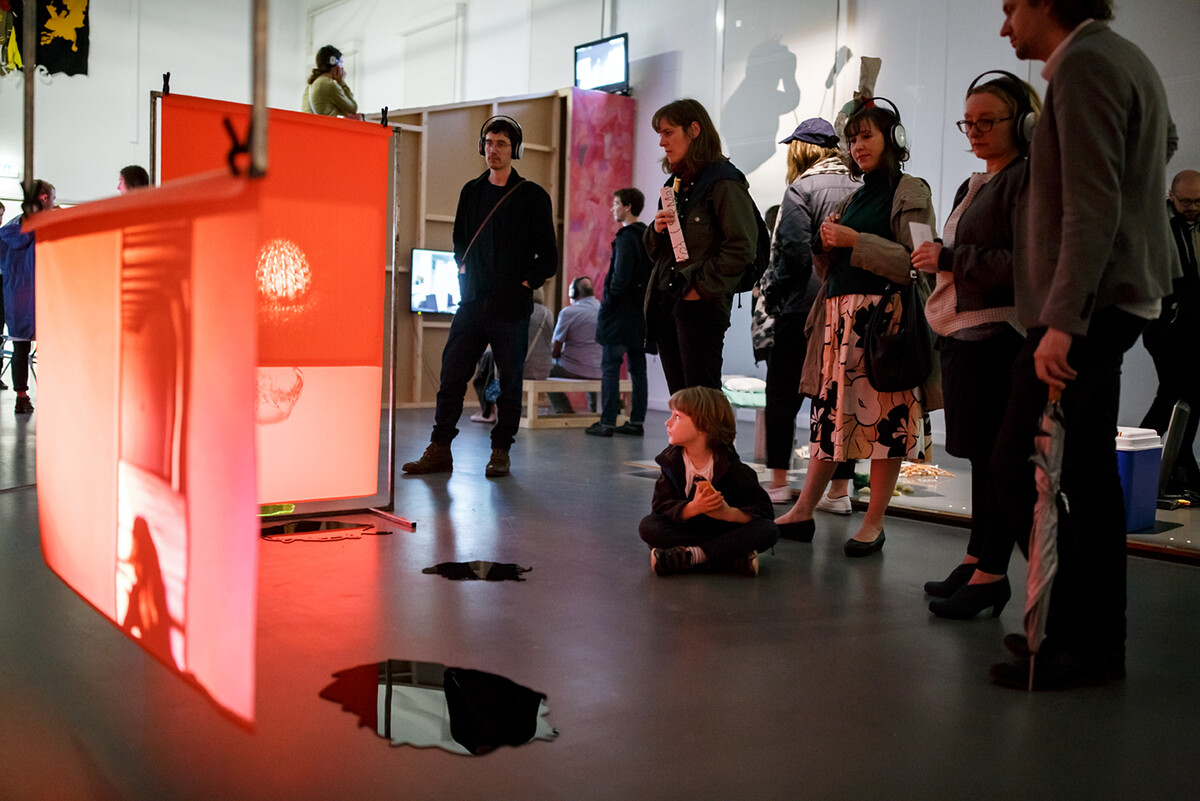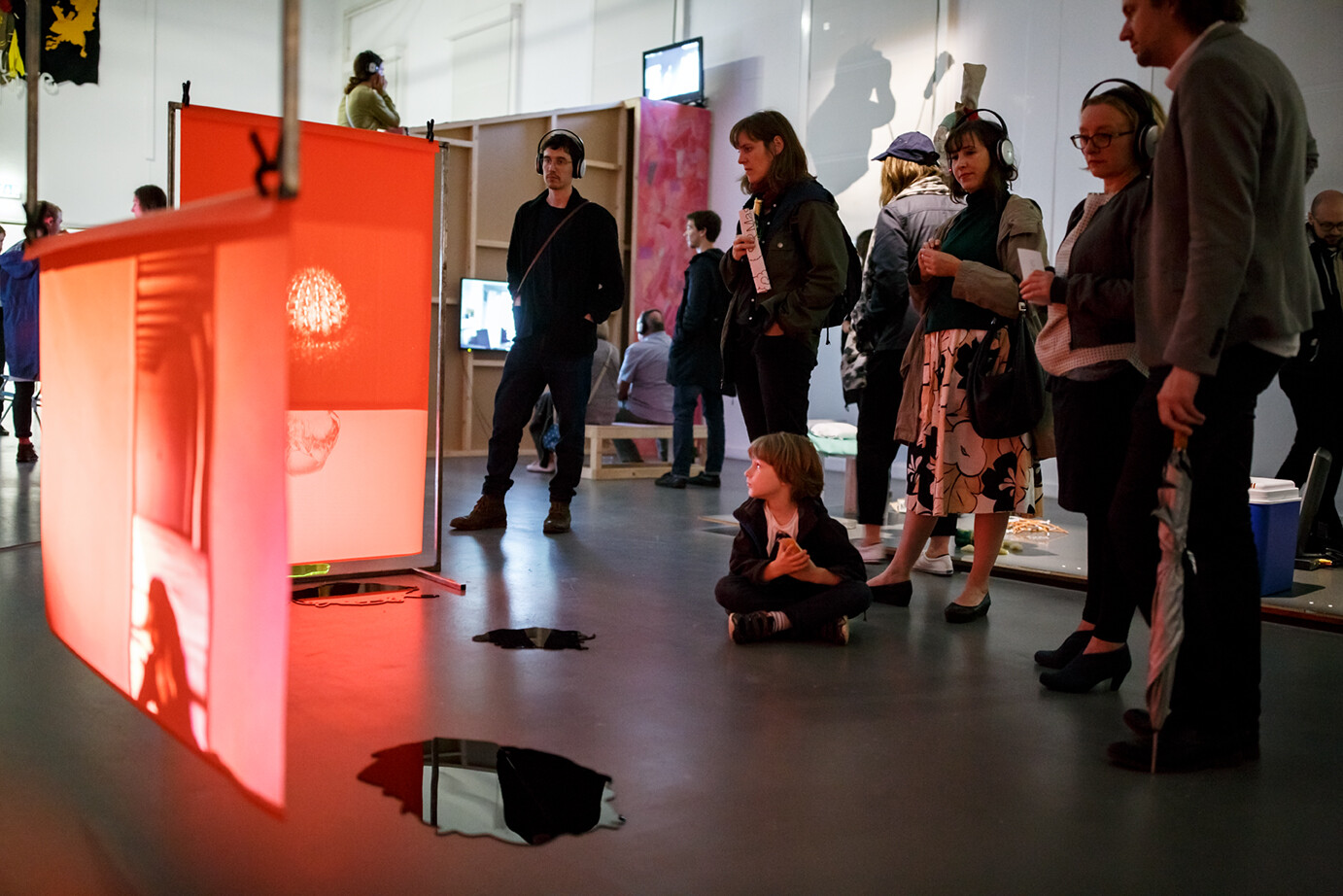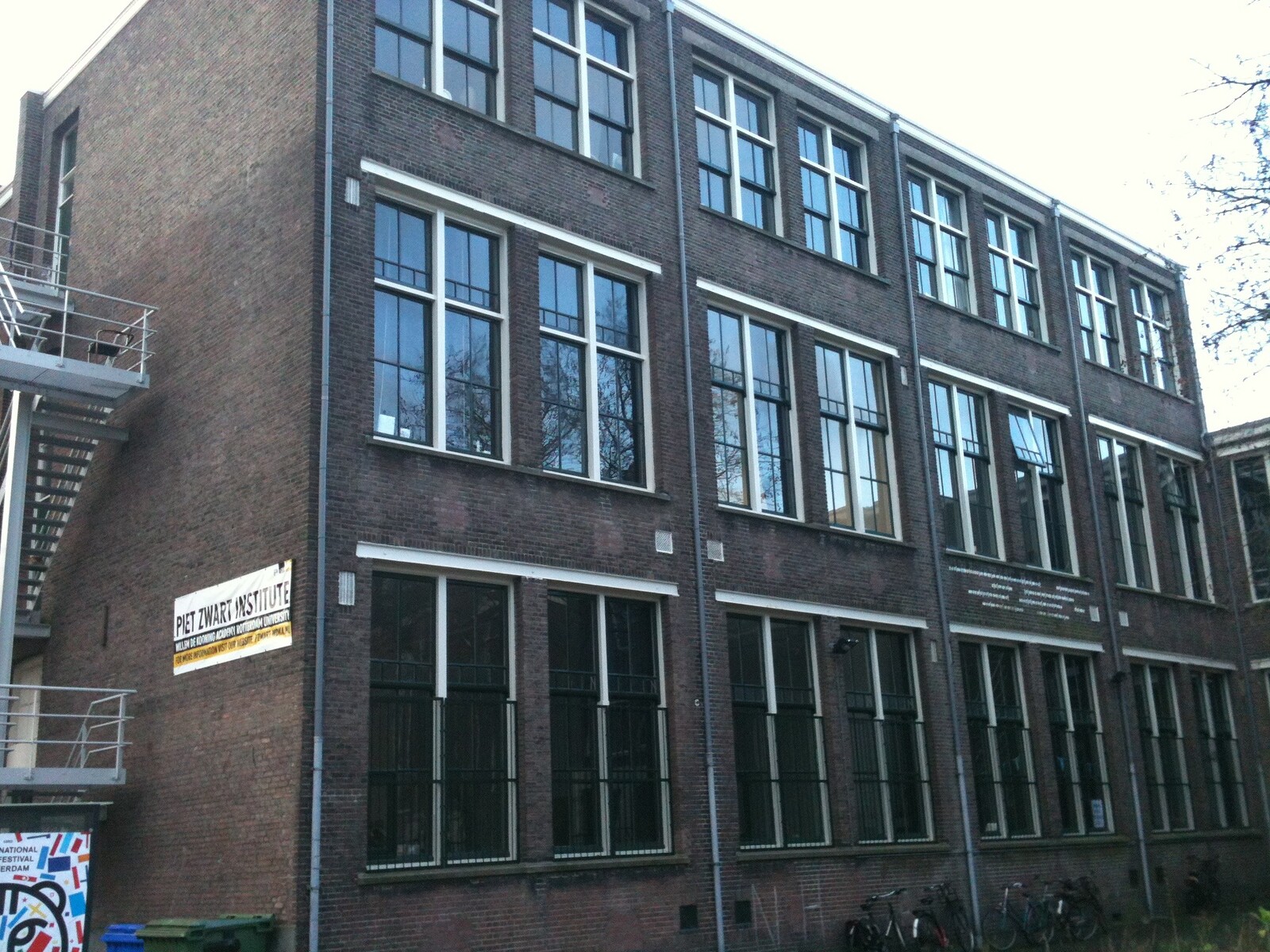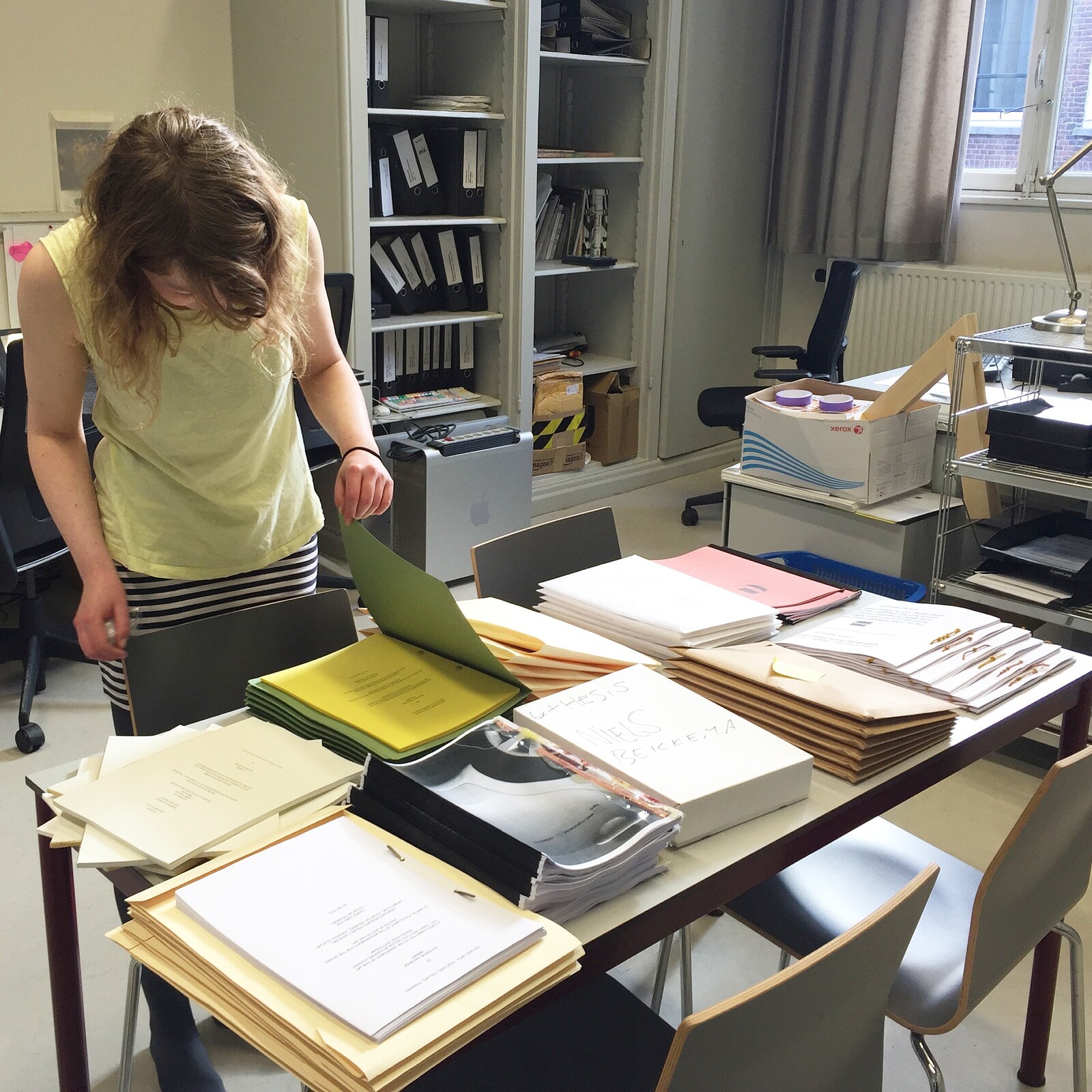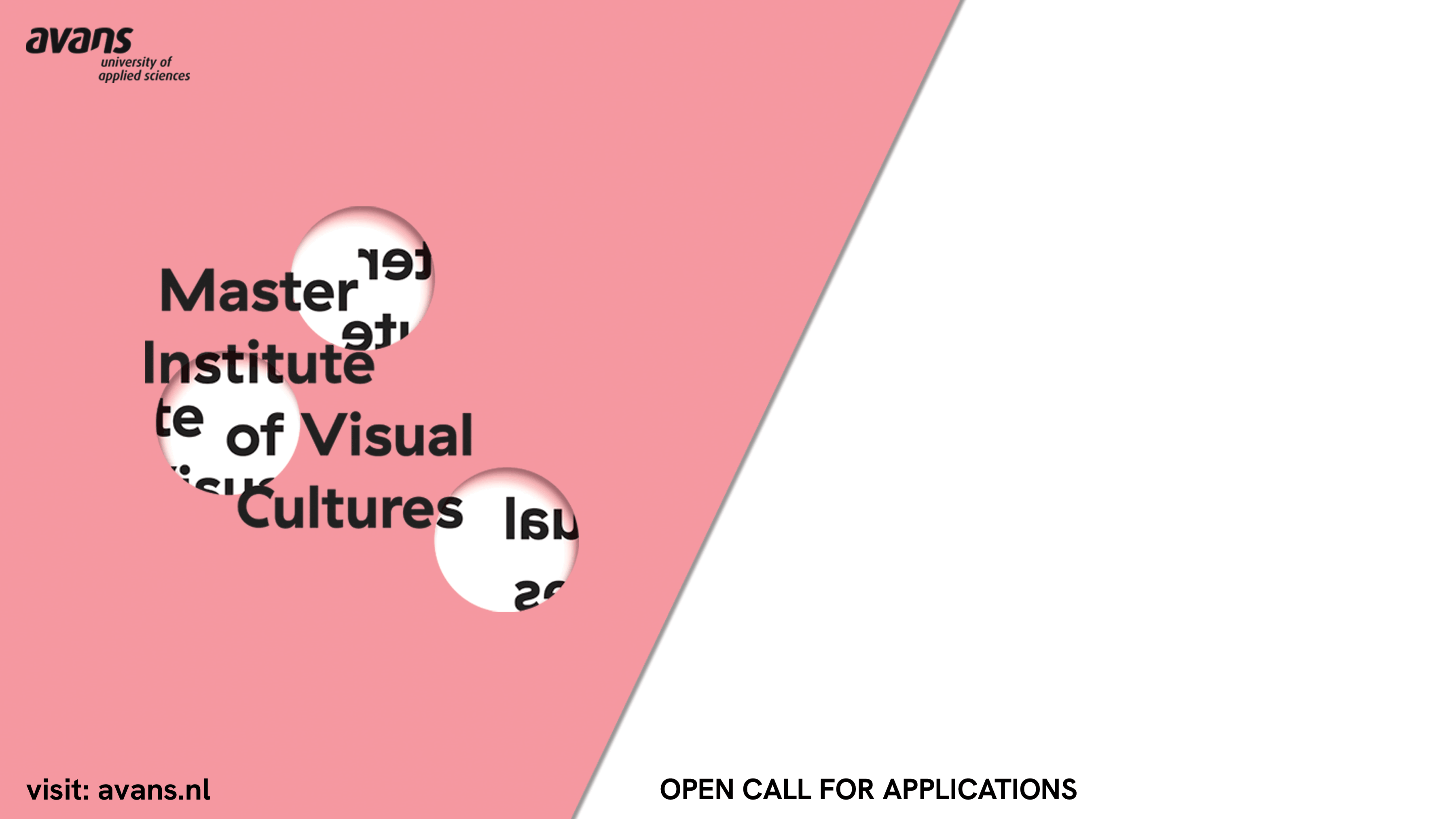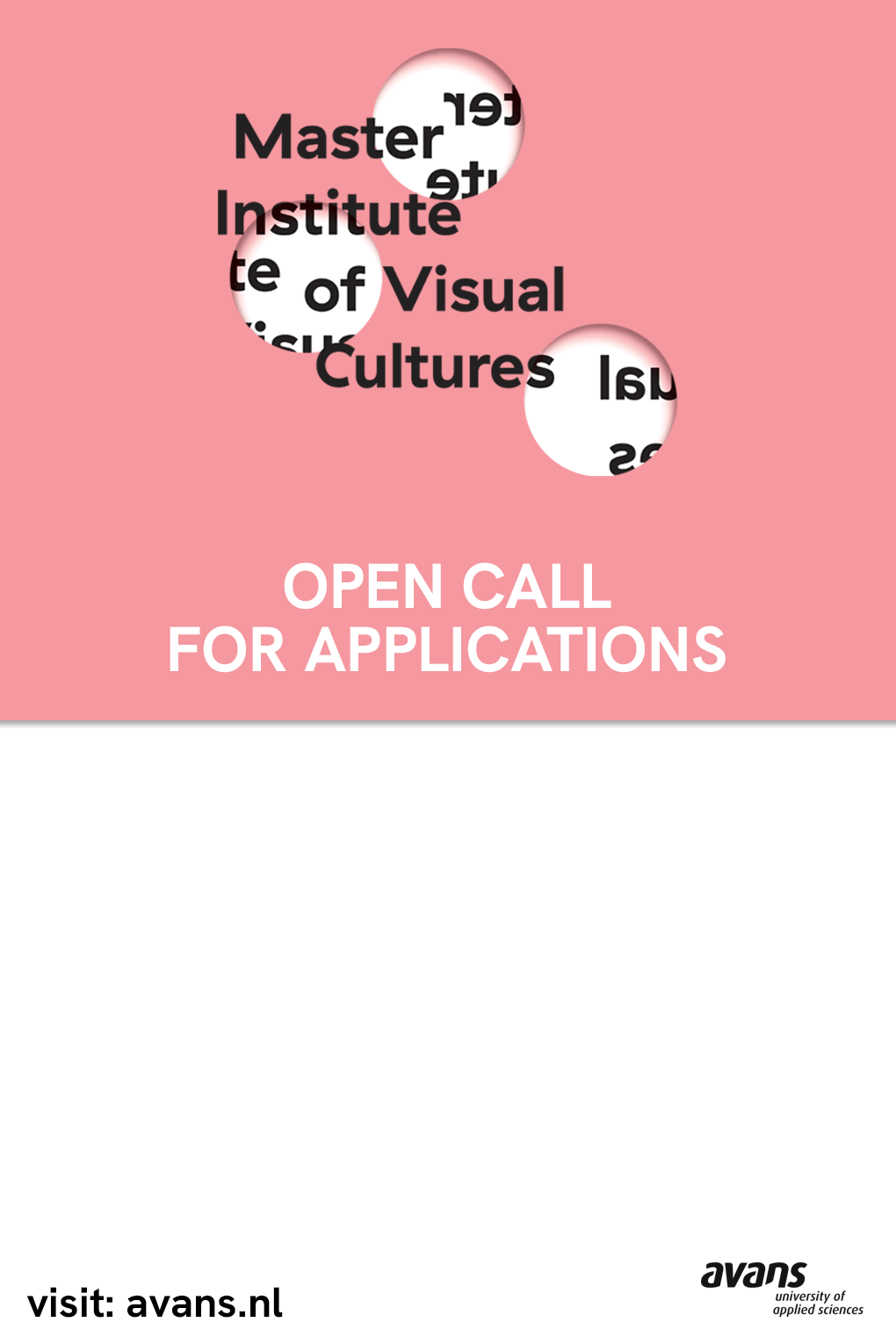On October 18, 2012, Vivian Sky Rehberg, then eight months into her tenure as course director of the master fine art program at the Piet Zwart Institute, gave a talk titled “Deschooling/Deskilling” at a packed auditorium shared by TENT Rotterdam and Witte de With Center for Contemporary Art. The audience gathered there was anxious to hear her positions on art education and her plans for the future of the MFA. After all, those plans would influence Rotterdam’s ongoing cultural ambitions: since 2001, when Rotterdam shared with Porto, Portugal the esteem of being the European Capital of Culture, the city has regarded (and at times misinterpreted) the arts as an important catalyst for its social, economic, and political discourse. At the turn of the millennium, the MFA program at the Piet Zwart Institute was founded as an extension of the bachelor’s programs at the Willem de Kooning Academie, the art and design school of the Rotterdam University of Applied Sciences. The Piet Zwart Institute soon developed three other graduate programs: Master Media Design and Communication, Master Education in Arts, and Master Interior Architecture Research and Design.
Since the early 2000s, Rotterdam’s cultural scene has exhibited a drive to be informed by the local, but also to resonate beyond the Netherlands’ second city. Rehberg had inherited a program with a worthy reputation for discursive and theoretical education rooted in a specific type of research-based art practice. Noteworthy about her lecture was the way in which she situated her arguments for advancing that tradition within “the educational turn” in contemporary art. First used by Irit Rogoff, professor of visual culture at Goldsmiths, in her essay “Turning” for e-flux journal #0, “the educational turn” was not meant to describe emblematic episodes such as discussion programs at art fairs, or the rise of educational projects initiated and hosted by art institutions. The focus here was the turn itself. This change was not concerned with a new balance between art and education, or even education’s impact on the discursive realm of contemporary art. Instead, Rehberg said:
“Educational turns and drives can and do flourish in informal settings and outside of schools. Many of today’s pedagogical experiments are socially and politically motivated and come with an explicit or implicit critique of the expansion of a neoliberal market for education supported in Europe by continental policy and university administrations alike. As a response, alternative educational structures and platforms stress more open access and appeal to broader audiences via the reduction or absence of fees, voluntary teaching and learning, and the freedom that comes with the rejection of a predetermined curriculum, learning outcomes, criteria assessment and the need for quality assurances. All of which are a necessary feature of accreditation requirements for degree-granting programs worldwide.”
The turn was to see contemporary art, its education, and its communication as informal subjects, a network of potentialities. Here, an artwork’s significance is formed and framed by the specificity of its medium, the maker, her peers, the audience, its platform (however that is defined), and its relationship to the history and theoretical structures from which the work originates. Rehberg’s lecture—not an explicit presentation of an outspoken future for the fine art program, but rather a modest elaboration on what was at stake, told from the recent past of art education—could be interpreted as an outline for her turn at the helm of the PZI MFA. The program focuses on art and its practice as an open subject; or as the institute’s own website describes it, the PZI MFA “emphasizes independent learning, research, and communication, and stresses the complexity and scope of issues raised in and by artworks. Research, defined simply as studious enquiry, is a key element of the curriculum.”
The Conversational Mode
Anke Bangma, the first course director of the PZI MFA and current artistic director of Rotterdam’s TENT exhibition space, established the program in 1999 with a deliberate focus on the potential that contemporary artistic practices could have by paralleling the institutional structures of the white cube and art market. The curriculum developed during her tenure emphasized more specific subjectivities embedded within an expanded field of research. With self-directed studio research and practice complemented by tutor-led thematic seminars and projects, a tradition began, one that most observers regard as the foundation for the program. Artists were given the opportunity to no longer think in terms of métier, but medium—medium being the mode they chose to operate from or language they employed to understand the urgency of their subject matter. Or, as Rehberg put it in her lecture, citing theorist and historian Thierry de Duve, “the métier gets practiced, the medium gets questioned. The métier gets transmitted, the medium communicates or gets communicated. The métier gets learned, the medium gets discovered.” Disciplinary specificity was bypassed in favor of a broader consideration of artistic practice particular to the medium best suited for the task at hand. Encouraging artists to see themselves as agents with the potential to author their own understanding of the field of contemporary art remains a key element of the curriculum. Moreover, the dialogue surrounding this deliberation of the artist as agent seems to be the explicit motivation of the program. Vanessa Ohlraun, now rector at the HBK Hochschule für Bildende Künste Braunschweig, continued Bangma’s pedagogical approach upon becoming the PZI MFA director in 2007. With her experience as a curator in Berlin, the program’s international network and visibility was enhanced along with the expanded depth she provided with her background in art history, cultural anthropology, and gender studies.
So, the stage was set for Rehberg to further fine-tune a program that adapted each year to contemporary issues that have the potential to cross-pollinate with art. In her lecture and citation of Rogoff, Rehberg advanced the “conversational mode,” a pedagogical method that “invents subjects and urgencies as it goes along and are recognized as such,” wherein the audience for art is constant and the frameworks for its consideration are continuously shifting. Rehberg notes that this tactic is speculative, but about thinking specifically. Studio visits, seminar discussions, and public programs with core and guest tutors help situate and distinguish tendencies among the students’ practices or discursive positions. The elective curriculum is devised around these assembled affinities by means of thematic seminars or project-based courses conceived by core tutors, and encounters with visiting guests such as cultural theorist Mieke Bal, artist Omer Fast, and writer Marina Vishmidt, or more recently artists Rana Hamadeh, Tyler Coburn, and Louwrien Wijers. The aim is to specify and sharpen the terms of the artist’s practice. The thematic seminar and project courses are often organized in collaboration with other institutions, in the Netherlands and elsewhere, which can offer a more visible platform for students to work from, and towards, while at the same time introducing topics and themes that initially seem uncommon to the field of contemporary art. Overall, the MFA aims to teach what an artist needs to sustain a practice, what Rehberg calls “good habits.”
The Community of Context
Founding tutor and artist Liesbeth Bik—she and her partner Jos van der Pol have collaborated since 1995 as Bik Van der Pol—noted that the most important thing at the PZI MFA is “creating [one’s] own context—even when it isn’t [one’s] own practice. This is crucial to understand what making art means.” Last year, Bik organized a three-month elective thematic project that took first- and second-year students into the harbor of Antwerp. The course comprised part of Bik Van der Pol’s participation in Lodgers 4, a program hosted by AIR Antwerpen—a residency space situated within the actual harbor—in collaboration with the M HKA Museum of Contemporary Art, Antwerp. What began as research into the social, ecological, and infrastructural past, present, and future of Europe’s second-largest seaport evolved into an extended investigation of its colonial and industrial history. For this thematic project, a program of workshops, lectures, and screenings as well as an exhibition at the M HKA was complemented by walks, works, and performances realized by students in the harbor’s surroundings. Students worked collectively alongside Piet Zwart Institute alumni, visiting artists, and advisors from various backgrounds and disciplines. Important here was the collective impulse to establish a communal context of each participant’s interests. That Bik Van der Pol shared with students their own occasion to work in the harbor on the invitation of a major museum speaks to a sense of generosity particular to the PZI MFA.
A strong understanding of community is an essential circumstance of studying there, owing especially to the small cohorts of ten to fifteen students in each year. Students are encouraged to self-organize tasks and assist their classmates, and they oblige, often performing in or contributing to each other’s works. Such was the case in a ten-day thematic project last year organized by artist/performer Michael Portnoy called “Devastatingly Experimental Sketch Komedy TV Ob-Pilot (D.E.S.K.T.O.P.),” in which students researched mainstream and experimental forms of TV sketch comedy and then cooperatively produced their own TV comedy, some of which was set in the culturally diverse neighborhoods of Rotterdam Zuid. This included developing the overall show concept, pitching ideas, writing sketches, rehearsing, shooting, and editing.
For his annual thematic seminar this year, critic, writer, and core tutor Jan Verwoert has organized “LIFEWORK,” an investigation into the philosophical, historical, political, and practical perspectives that inform ideas of “the personal” in artistic practice. The class researches what it means to politicize the personal, and how or whether this individualism can return to the collective. His seminars often consist of a theoretical study that then ventures into practical exercises and experiments tailored to the study’s possible outcomes. Recently, core tutors Katarina Zdjelar and Bernd Krauß have organized thematic projects and seminars around such distinct topics as the history and applications of the concept of performativity, or the very early German Romantic Pfingstreise by eighteenth-century writers W. H. Wackenroder and Ludwig Tieck. The latter comprised a week-long research trip to the Alpine foothills of Franconian Switzerland, which Krauß described as an inquiry for students to determine how much stability they need for their practices. “It’s more an economy than a pedagogical ideology,” Krauß said. “It’s about understanding your responsibility to making work and constantly reclaiming your autonomy.”
Within the PZI MFA program structure, students have ample access to diverse subjects and practices that provide a curious balance between an unsettling unknown and an enhanced capacity for research and its application to various artistic modes. Research and experimentation offer the necessary ECTS credits required to graduate; more importantly, however, they guarantee the continual exercise of expanded perception and practice in a unique institutional environment in the center of Rotterdam. Hidden among apartment buildings, shops, and a neighborhood abundant with other cultural spaces—TENT Rotterdam, Showroom MAMA, Witte de With Center for Contemporary Art, Museum Boijmans van Beuningen, Het Nieuwe Instituut and V2_, Institute for the Unstable Media—sits the building that houses the Piet Zwart Institute’s MFA and Master Media Design and Communication programs. Students may access the building 24/7, and may also use the facilities—“material stations,” “fabric stations,” “publication stations”—at the Willem de Kooning Academie during its opening hours. The Piet Zwart Institute building at Karel Doormanhof 45 feels like a satellite off that larger school, where studio spaces are shared among two or three students and the offices of the master programs’ staff are independently maintained. And while it may appear crowded, the close proximity of students and administration is an asset, rather than a constraint on the students’ opportunities.
Student interaction in the MFA is constant. Not only do first- and second-year students share studios, but all students participate in weekly critiques reinforcing the conversational mode particular to the MFA at Piet Zwart. One student is assigned the task of moderator and must prepare a plan for the critique with the student whose work will be discussed. During the hour-and-a-half long sessions, the student whose work is reviewed is expected to remain silent and absorb all interpretations of their work—formal, conceptual, and otherwise—by the other students. The work presented may be ongoing research or finished projects. Critiques can take place in the studio, in one of the two presentation spaces or outside the building in the form of an expedition. Students are required to organize two crits of their own work per year and attend a dozen more as audience. Through critically constructive (if not remarkably polite) discussion, the student on the hot seat is provided insight into how her work is experienced by her peers.
MFA candidates complete a written thesis under the guidance of one of the two writing tutors: Kate Briggs, writer and translator, or Steve Rushton, writer and editor. Thesis writing—the oft-spoken crux of the MFA degree due to its (frequently misconstrued) formal and academic criteria—begins at the end of the first year. Students are encouraged to allow research for their written thesis to operate within the other aspects of the program so that the somewhat daunting reality of writing a thesis may inform their practice rather than distract from it.
The graduate exhibition at the end of the second year takes place at one of Rotterdam’s institutional spaces. Moreover, an external curator is invited to bring together an often disparate collection of media and conceptual frameworks. Recent curators have included Arnisa Zeqo, Matteo Lucchetti, and Christina Li. Generally with MFA graduation shows, the result is that the strength of one practice over another—by all means in the eye of the beholder—is upheld as representative of the success of the course. In an effort to counteract that kind of hierarchical nature, last year’s show “Assemble Relatives,” curated by Maaike Gouwenberg, was spread over three cultural institutions in Rotterdam: TENT (where PZI graduation shows have previously been held), Showroom MAMA, and ramfoundation. This allowed for greater concentration on the different modes of practice within the graduating class, and created a constructive nuance to the subject matter and urgency that each student had been working with.
The Institutional Wind
Another important aspect of the course—mentioned by all the tutors and affirmed in conversations with current students—is the manner with which Vivian Sky Rehberg and the program’s small administration ensure that students are able to work in a human environment removed as much as possible from the bureaucratic demands that come with running an MFA program. Since the signing of the Bologna declaration in 1999 and the increased expansion of practical and professional quality assurances resulting from austerity measures in the Dutch cultural/educational sector for the past five years, there is a heightened state of expectation on the return of investment in MFA programs—both from the government and the students themselves. For students from the European Union or European Economic Area (who apply for their first master’s course in the Netherlands), the annual fee for the full-time course in 2016–17 is 1984 euros. For non-EU/EEA students, the tuition for the full-time and part-time courses rises to 9900 euros. While these are relatively small fees compared to MFA programs in North America, it is still a significant amount of money and the anticipation of success seems more heightened each year. An additional challenge is upholding an international scope of potential students — made more complicated by Brexit (UK students have been a major component of the program in recent years).
The proliferation of MFA programs and the steady growth of PhD art programs across Europe is at the back of the minds of both aspiring artists as well as administrators. But, the alumni who stay on in Rotterdam to continue their practice under (still) advantageous cultural/economic conditions maximize the financial investment in the program. Because of their enhanced sense of community, they often also work with the PZI MFA and its tutors on projects and establish their own spaces to present art—like Peach and Wolfart. Creating an educational environment for students that minimalizes these practical concerns is essential to the success of the PZI MFA program, wherein research on contemporary art and its capacity must remain an open subject.
The institution advertises the educational context it operates as such: “Because qualifications for an MFA are first and foremost embodied in artworks and the research that leads to them, it is sometimes difficult to measure these quantifiably in a one-to-one relationship. As a counterbalance, the MFA program maintains that the students’ ability to reflect critically upon and to make explicit their artistic questions, methods, and decisions, is inherent to advanced artistic practice.” What is not explicitly advertised alongside this—yet equally important to the PZI MFA—is the notion of having fun in learning and producing. By means of the unique themes and approaches to the courses and workshops—as well as the disposition of the tutors that devised them—students are reminded that in order to discover, analyze, and formulate positions within the open subject of contemporary art, they must try to understand the uncanny in things, including their own circumstances.
Taking all of this into account, it seems that Vivian Sky Rehberg’s lecture five years ago did indeed contain a plan for the present and, hopefully, future of the program. Since then, the Piet Zwart MFA’s constantly evolving curriculum has influenced and been influenced by successive groups of students. Opportunities to change the direction of the course into a more streamlined and homogeneous program have revealed themselves over the past years, yet the continuity of community and conversation has triumphed. Art practice and its education as an open subject, communicated in a human environment has been the lasting result.
—Huib Haye van der Werf
